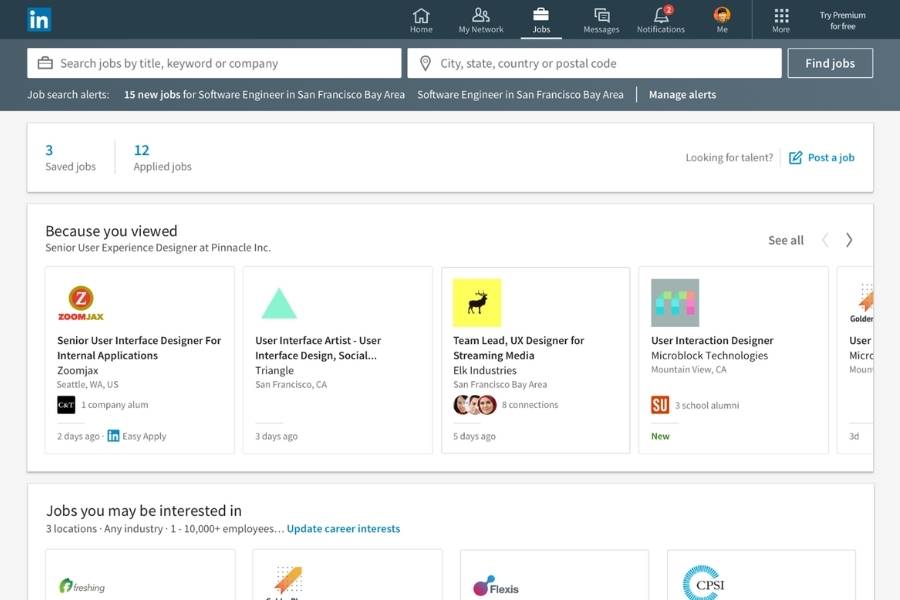Online Applications
First of all, select the jobs you actually want. Research has shown that graduates end up applying to jobs because of the ease of accessing online forms, rather than because of their suitability for the role. Try to avoid spending time filling out applications for jobs you don't really want or for companies you know nothing about. Instead, invest more time in those you do want. Employers can spot who is genuinely interest in the job they are offering.
Once you have logged on to the form, find out what information is required from you. What questions do they ask? Do they want you to attach a CV? Also familiarise yourself with how to navigate around the form. Some forms allow you to dip in and out of each section, whilst in others you must move through every page to get to the one you want. Check all the links, as these are not always clear and can be misleading.
Aim to send in your application ahead of any deadline. If you wait until the last minute, you may have problems accessing the company's website, as 80% of candidates try to submit their application forms during the last few days. Even if you do access the website, the link to the job and your application form might have expired automatically. You might experience technical problems when you try to submit your form - so the last day for applications isn't the day to be contacting the organisation for technical help.
Where to Apply?
There are many jobs posted every day on our site. We cover all job areas and have excellent recruiters who will find you the perfect job match. Other places to look include LInkedIn and Reed. Make sure you have read our guide to LinkedIn so that you can make the most out of Job applications!

Typical questions you'll encounter
These can include questions like:
- "Please use this space to tell us what you have achieved that makes you stand out."
- "Tell us about a time when you have had to overcome significant difficulties to achieve something. Tell us how you approached the issue and managed to overcome any obstacles."
- "Describe a situation when as a leader of a group you directed its efforts and how you gained commitment to achieve results."
Some employer application forms are designed to be difficult and off-putting, they use this as an initial filter to test your commitment and interest in them.
Research and planning
You should always begin with research and planning. Think about what skills and abilities you have and how you are going to demonstrate them to an employer. Reflect on the experiences that have developed your skills, part-time jobs, work experience, involvement with student groups.
Be clear in your own mind why you have chosen this organisation and this particular role within it. Use the company literature and website to find out about the employer and the role you are applying for.
Plan your answers by reading the question and thinking of a variety of examples from the experiences you have had so far. Don't restrict your examples to what you have done for your degree, use part-time jobs, volunteer work and membership of clubs and societies to provide the employer with a picture of what you are like and the range of skills you have to offer.

Completing the questions
Read the questions very carefully and tailor your answers to them. If the questions have a few different parts ensure that you have answered them all fully.
Avoid waffle; you may not have a great deal of space and employers don't have time to wade through pages and pages.
Check it, or ask someone else to have a look at it for you. Ask them to look out for grammar and spelling in particular. You can go to a drop in session at your careers service if you would like a careers adviser to give you some help. Keep a copy - this will help you to prepare for any graduate interviews by looking back at what you told employers and recapping on the examples that you used.
After the initial factual questions, many forms have a blank space with a heading something like this:
Additional information - Please enter below any additional information in support of your application. If you require more space than is provided please ensure that any attached papers contain your name and the post for which you are applying.
Having matched yourself to a vacancy, you should have a pretty good idea of what goes in this space. Here are some guidelines to help you.
- Look at your analysis of the job vacancy, and draw out the key criteria the recruiter is seeking. Aim for about seven or eight paragraph headings.
- Delete any criteria which are already covered by the details you have filled in on the application form (e.g. don't repeat lists of relevant qualifications).
- Using your full range of experiences, provide evidence under each paragraph heading (see your notes when you matched yourself to a vacancy).
- Write an introduction and a conclusion. For example, your introduction could explain why you want the job, your conclusion could summarise your best selling points.
If it says you may use additional sheets, it implies that additional sheets are expected.
Some forms do not allow you much freedom, and have very specific questions. What you need to do with questions like these is break them down. Finally, when you have three parts to a question make sure you answer each part of the question.
Our top tips for completing graduate job applications
- Think about the work you want to do and how you can demonstrate that you have the required skills and abilities.
- Think about the employer and how you can show your commitment and motivation to work for the organisation.
- Research the employer and the occupation so that your application is fully informed.
- Give yourself plenty of time. These things always take longer than you think and you want to do yourself justice.
- Read the form through first and make notes in draft about what you are going to say in which section. Use it as a clue to what the employer or course wants from you.
- Think about how you are going to put forward the evidence they want to show you have the qualities they are looking for.
- Make sure you keep a copy of the form so you can remember what was said when you are invited to interview.
- Document when you apply, and how you did it to help you with following up graduate job applications.



